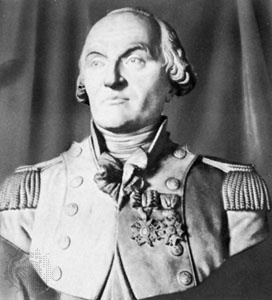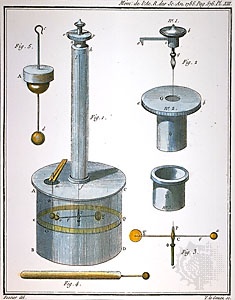Coulomb, Charles-Augustin de
French physicist
born June 14, 1736, Angoulême, France
died August 23, 1806, Paris
 French physicist best known for the formulation of Coulomb's law, which states that the force between two electrical charges is proportional to the product of the charges and inversely proportional to the square of the distance between them. Coulombic force (Coulomb force) is one of the principal forces involved in atomic reactions.
French physicist best known for the formulation of Coulomb's law, which states that the force between two electrical charges is proportional to the product of the charges and inversely proportional to the square of the distance between them. Coulombic force (Coulomb force) is one of the principal forces involved in atomic reactions.Coulomb spent nine years in the West Indies as a military engineer and returned to France with impaired health. Upon the outbreak of the French Revolution, he retired to a small estate at Blois and devoted himself to scientific research. In 1802 he was appointed an inspector of public instruction.
 Coulomb developed his law as an outgrowth of his attempt to investigate the law of electrical repulsions as stated by Joseph Priestley of England. To this end he invented sensitive apparatus to measure the electrical forces involved in Priestley's law and published his findings in 1785–89. He also established the inverse square law of attraction and repulsion of unlike and like magnetic poles, which became the basis for the mathematical theory of magnetic forces developed by Siméon-Denis Poisson. He also did research on friction of machinery, on windmills, and on the elasticity of metal and silk fibres. The coulomb, a unit of electric charge, was named in his honour.
Coulomb developed his law as an outgrowth of his attempt to investigate the law of electrical repulsions as stated by Joseph Priestley of England. To this end he invented sensitive apparatus to measure the electrical forces involved in Priestley's law and published his findings in 1785–89. He also established the inverse square law of attraction and repulsion of unlike and like magnetic poles, which became the basis for the mathematical theory of magnetic forces developed by Siméon-Denis Poisson. He also did research on friction of machinery, on windmills, and on the elasticity of metal and silk fibres. The coulomb, a unit of electric charge, was named in his honour.- Algerian Muslim Ulama, Association of
- Algernon Charles Swinburne
- Algernon Henry Blackwood
- Algernon Percy, 10th earl of Northumberland
- Algernon Percy Northumberland, 10th earl of
- Algernon Sidney
- Alger Of Liège
- Al- Gharbīyah
- al- Ghazālī
- Alghero
- Al- Ghurdaqah
- Algiers
- Algirdas
- Algol
- Algonquian languages
- Algonquin
- pratyeka-buddha
- pratyāhāra
- pratītya-samutpāda
- prau
- Pravda
- prawn
- Praxiteles
- prayer
- Prayer of Manasseh